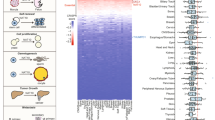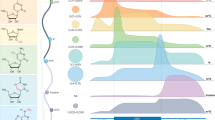Abstract
N6-Methyladenosine (m6A) RNA modification is present in messenger RNAs (mRNA), ribosomal RNAs (rRNA), and spliceosomal RNAs (snRNA) in humans. Although mRNA m6A modifications have been extensively studied and shown to play critical roles in many cellular processes, the identity of m6A methyltransferases for rRNAs and the function of rRNA m6A modifications are unknown. Here we report a new m6A methyltransferase, ZCCHC4, which primarily methylates human 28S rRNA and also interacts with a subset of mRNAs. ZCCHC4 knockout eliminates m6A4220 modification in 28S rRNA, reduces global translation, and inhibits cell proliferation. We also find that ZCCHC4 protein is overexpressed in hepatocellular carcinoma tumors, and ZCCHC4 knockout significantly reduces tumor size in a xenograft mouse model. Our results highlight the functional significance of an rRNA m6A modification in translation and in tumor biology.
This is a preview of subscription content, access via your institution
Access options
Access Nature and 54 other Nature Portfolio journals
Get Nature+, our best-value online-access subscription
$29.99 / 30 days
cancel any time
Subscribe to this journal
Receive 12 print issues and online access
$259.00 per year
only $21.58 per issue
Buy this article
- Purchase on Springer Link
- Instant access to full article PDF
Prices may be subject to local taxes which are calculated during checkout




Similar content being viewed by others
Change history
08 February 2019
In the version of this article originally published, the references were incorrectly re-ordered during production. The hyphen in “N6-methyladenosine” in the title was also superscript. The errors have been corrected in the HTML and PDF versions of the paper.
References
Roundtree, I. A., Evans, M. E., Pan, T. & He, C. Dynamic RNA modifications in gene expression regulation. Cell 169, 1187–1200 (2017).
Fu, Y., Dominissini, D., Rechavi, G. & He, C. Gene expression regulation mediated through reversible m6A RNA methylation. Nat. Rev. Genet. 15, 293–306 (2014).
Gilbert, W. V., Bell, T. A. & Schaening, C. Messenger RNA modifications: form, distribution, and function. Science 352, 1408–1412 (2016).
Zhao, B. S., Roundtree, I. A. & He, C. Post-transcriptional gene regulation by mRNA modifications. Nat. Rev. Mol. Cell Biol. 18, 31–42 (2017).
Batista, P. J. et al. m6A RNA modification controls cell fate transition in mammalian embryonic stem cells. Cell. Stem. Cell. 15, 707–719 (2014).
Cui, Q. et al. m6A RNA methylation regulates the self-renewal and tumorigenesis of glioblastoma stem cells. Cell Rep. 18, 2622–2634 (2017).
Alarcón, C. R., Lee, H., Goodarzi, H., Halberg, N. & Tavazoie, S. F. N 6-methyladenosine marks primary microRNAs for processing. Nature 519, 482–485 (2015).
Liu, N. et al. N6 -methyladenosine-dependent RNA structural switches regulate RNA-protein interactions. Nature 518, 560–564 (2015).
Xiang, Y. et al. RNA m6A methylation regulates the ultraviolet-induced DNA damage response. Nature 543, 573–576 (2017).
Zhou, J. et al. Dynamic m6A mRNA methylation directs translational control of heat shock response. Nature 526, 591–594 (2015).
Liu, J. et al. m6A mRNA methylation regulates AKT activity to promote the proliferation and tumorigenicity of endometrial cancer. Nat. Cell Biol. 20, 1074–1083 (2018).
Huang, H. et al. Recognition of RNA N 6-methyladenosine by IGF2BP proteins enhances mRNA stability and translation. Nat. Cell Biol. 20, 285–295 (2018).
Piekna-Przybylska, D., Decatur, W. A. & Fournier, M. J. The 3D rRNA modification maps database: with interactive tools for ribosome analysis. Nucleic Acids Res. 36, D178–D183 (2008).
van Nues, R. W. & Watkins, N. J. Unusual C´/D´ motifs enable box C/D snoRNPs to modify multiple sites in the same rRNA target region. Nucleic Acids Res. 45, 2016–2028 (2017).
Liu, N. et al. Probing N 6-methyladenosine RNA modification status at single nucleotide resolution in mRNA and long noncoding RNA. RNA 19, 1848–1856 (2013).
Sergiev, P. V., Aleksashin, N. A., Chugunova, A. A., Polikanov, Y. S. & Dontsova, O. A. Structural and evolutionary insights into ribosomal RNA methylation. Nat. Chem. Biol. 14, 226–235 (2018).
Natchiar, S. K., Myasnikov, A. G., Kratzat, H., Hazemann, I. & Klaholz, B. P. Visualization of chemical modifications in the human 80 S ribosome structure. Nature 551, 472–477 (2017).
Frye, M., Harada, B. T., Behm, M. & He, C. RNA modifications modulate gene expression during development. Science 361, 1346–1349 (2018).
Liu, J. et al. A METTL3-METTL14 complex mediates mammalian nuclear RNA N 6-adenosine methylation. Nat. Chem. Biol. 10, 93–95 (2014).
Ping, X. L. et al. Mammalian WTAP is a regulatory subunit of the RNA N 6-methyladenosine methyltransferase. Cell Res. 24, 177–189 (2014).
Wang, X. et al. Structural basis of N 6-adenosine methylation by the METTL3-METTL14 complex. Nature 534, 575–578 (2016).
Bokar, J. A., Shambaugh, M. E., Polayes, D., Matera, A. G. & Rottman, F. M. Purification and cDNA cloning of the AdoMet-binding subunit of the human mRNA (N 6-adenosine)-methyltransferase. RNA 3, 1233–1247 (1997).
Pendleton, K. E. et al. The U6 snRNA m6A methyltransferase METTL16 regulates SAM synthetase intron retention. Cell 169, 824–835.e814 (2017).
Warda, A. S. et al. Human METTL16 is a N 6-methyladenosine (m6A) methyltransferase that targets pre-mRNAs and various non-coding RNAs. EMBO Rep 18, 2004–2014 (2017).
Mendel, M. et al. Methylation of structured RNA by the m6A writer METTL16 is essential for mouse embryonic development. Mol. Cell 71, 986–1000.e1011 (2018).
Doxtader, K. A. et al. Structural basis for regulation of METTL16, an S-adenosylmethionine homeostasis factor. Mol. Cell 71, 1001–1011.e1004 (2018).
Albrecht, M. & Lengauer, T. Novel Sm-like proteins with long C-terminal tails and associated methyltransferases. FEBS Lett. 569, 18–26 (2004).
Benhalevy, D. et al. The human CCHC-type zinc finger nucleic acid-binding protein binds G-rich elements in target mRNA coding sequences and promotes translation. Cell Rep. 18, 2979–2990 (2017).
Jones, M. R. et al. Zcchc11-dependent uridylation of microRNA directs cytokine expression. Nat. Cell Biol. 11, 1157–1163 (2009).
Wen, J. et al. Zc3h13 regulates nuclear RNA m6A methylation and mouse embryonic stem cell self-renewal. Mol. Cell 69, 1028–1038.e1026 (2018).
Thomson, E., Ferreira-Cerca, S. & Hurt, E. Eukaryotic ribosome biogenesis at a glance. J. Cell Sci. 126, 4815–4821 (2013).
Wang, X. et al. N 6-methyladenosine-dependent regulation of messenger RNA stability. Nature 505, 117–120 (2014).
Wang, X. et al. N 6-methyladenosine modulates messenger RNA translation efficiency. Cell 161, 1388–1399 (2015).
Sloan, K. E. et al. Tuning the ribosome: the influence of rRNA modification on eukaryotic ribosome biogenesis and function. RNA Biol. 14, 1138–1152 (2017).
Arai, T. et al. Single methylation of 23 S rRNA triggers late steps of 50 S ribosomal subunit assembly. Proc. Natl Acad. Sci. USA 112, E4707–E4716 (2015).
Khatter, H., Myasnikov, A. G., Natchiar, S. K. & Klaholz, B. P. Structure of the human 80 S ribosome. Nature 520, 640–645 (2015).
Punekar, A. S., Liljeruhm, J., Shepherd, T. R., Forster, A. C. & Selmer, M. Structural and functional insights into the molecular mechanism of rRNA m6A methyltransferase Rlm. J. Nucleic Acids Res. 41, 9537–9548 (2013).
Golovina, A. Y. et al. The last rRNA methyltransferase of E. coli revealed: the yhiR gene encodes adenine-N 6 methyltransferase specific for modification of A2030 of 23 S ribosomal RNA. RNA 18, 1725–1734 (2012).
Wei, J. et al. Differential m6A, m6Am, and m1A demethylation mediated by FTO in the cell nucleus and cytoplasm. Mol. Cell 71, 973–985.e975 (2018).
Jia, G. et al. N6-methyladenosine in nuclear RNA is a major substrate of the obesity-associated FTO. Nat. Chem. Biol. 7, 885–887 (2011).
Tang, C. et al. ALKBH5-dependent m6A demethylation controls splicing and stability of long 3'-UTR mRNAs in male germ cells. Proc. Natl Acad. Sci. USA 115, E325–E333 (2018).
Zhang, S. et al. m6A demethylase ALKBH5 maintains tumorigenicity of glioblastoma stem-like cells by sustaining FOXM1 expression and cell proliferation program. Cancer Cell. 31, 591–606.e596 (2017).
Li, Z. et al. FTO plays an oncogenic role in acute myeloid leukemia as a N 6-methyladenosine RNA demethylase. Cancer Cell 31, 127–141 (2017).
Liu, F. et al. ALKBH1-mediated tRNA demethylation regulates translation. Cell 167, 816–828.e816 (2016).
Kawarada, L. et al. ALKBH1 is an RNA dioxygenase responsible for cytoplasmic and mitochondrial tRNA modifications. Nucleic Acids Res. 45, 7401–7415 (2017).
Stojković, V. & Fujimori, D. G. Radical SAM-mediated methylation of ribosomal RNA. Methods Enzymol. 560, 355–376 (2015).
Ran, F. A. et al. Genome engineering using the CRISPR-Cas9 system. Nat. Protoc. 8, 2281–2308 (2013).
Hafner, M. et al. PAR-CliP–a method to identify transcriptome-wide the binding sites of RNA binding proteins. J. Vis. Exp. 41, 2034 (2010).
Esposito, A. M. et al. Eukaryotic polyribosome profile analysis. J. Vis. Exp. 40, 1948 (2010).
Acknowledgements
We thank X. Wang, L. Hu, H. Shi, F. Liu, and J. Wei from C.H.’s laboratory for discussions and for sharing experiments materials. We thank J. Tauler for editing the manuscript. This work was supported by the National Institutes of Health grants HG008935 (to C.H.) and GM113194 (to T.P. and C.H.). C.H. is an investigator of the Howard Hughes Medical Institute (HHMI). This work also supported by National Natural Science Foundation of China (81602513; to J.C.) and funds from Fudan University, H.M. is supported by the Postdoctoral International Exchange Program of the China Postdoctoral Council (CPC). X.W. is supported by the National Institute of Diabetes and Digestive and Kidney Diseases of the National Institutes of Health under Award Number 1K01 DK111764.
Author information
Authors and Affiliations
Contributions
H.M., T.P., Y.S. and C.H. designed the experiments. H.M. purified the recombinant ZCCHC4 protein, established the ZCCHC4 knockout stable cell lines, and carried out the in vitro and in vivo enzyme activity experiments and rescue experiments. X.W. performed polysome profile sequencing and reporter assays. J.C. performed WB and IHC in liver cancer samples and tumor growth assay in nude mice. Q.D. and K.C. assisted with enzyme activity experiments. R.L. and Z.L. helped with PAR-CLIP analysis. H.C. and Y.G.S. helped measure in vivo enzyme activity. F.L. helped design the experiments. J.F. helped prepare patient samples and analyze data. S.K.N. and B.P.K. helped with cryo-EM analysis of the m6A4220 modification site. H.M., X.W., T.P., Y.S. and C.H. wrote the manuscript.
Corresponding authors
Ethics declarations
Competing interests
Y.S. is a co-founder of Constellation Pharmaceuticals, Inc., and Athelas Therapeutics. C.H. is a scientific founder of Accent Therapeutics, Inc. and a member of its scientific advisory board.
Additional information
Publisher’s note: Springer Nature remains neutral with regard to jurisdictional claims in published maps and institutional affiliations.
Supplementary information
Supplementary Text and Figures
Supplementary Figures 1–10
Supplementary Dataset 1
PAR-CLIP showing ZCCHC4-bound RNAs in cells
Supplementary Dataset 2
ZCCHC4 KO affects translation
Rights and permissions
About this article
Cite this article
Ma, H., Wang, X., Cai, J. et al. N6-Methyladenosine methyltransferase ZCCHC4 mediates ribosomal RNA methylation. Nat Chem Biol 15, 88–94 (2019). https://doi.org/10.1038/s41589-018-0184-3
Received:
Accepted:
Published:
Issue Date:
DOI: https://doi.org/10.1038/s41589-018-0184-3
This article is cited by
-
Clinical significance of RNA methylation in hepatocellular carcinoma
Cell Communication and Signaling (2024)
-
RNA modification-mediated mRNA translation regulation in liver cancer: mechanisms and clinical perspectives
Nature Reviews Gastroenterology & Hepatology (2024)
-
RNA N6-methyladenosine modifications in urological cancers: from mechanism to application
Nature Reviews Urology (2024)
-
Heterogeneity of chemical modifications on RNA
Biophysical Reviews (2024)
-
METTL16 promotes liver cancer stem cell self-renewal via controlling ribosome biogenesis and mRNA translation
Journal of Hematology & Oncology (2024)



